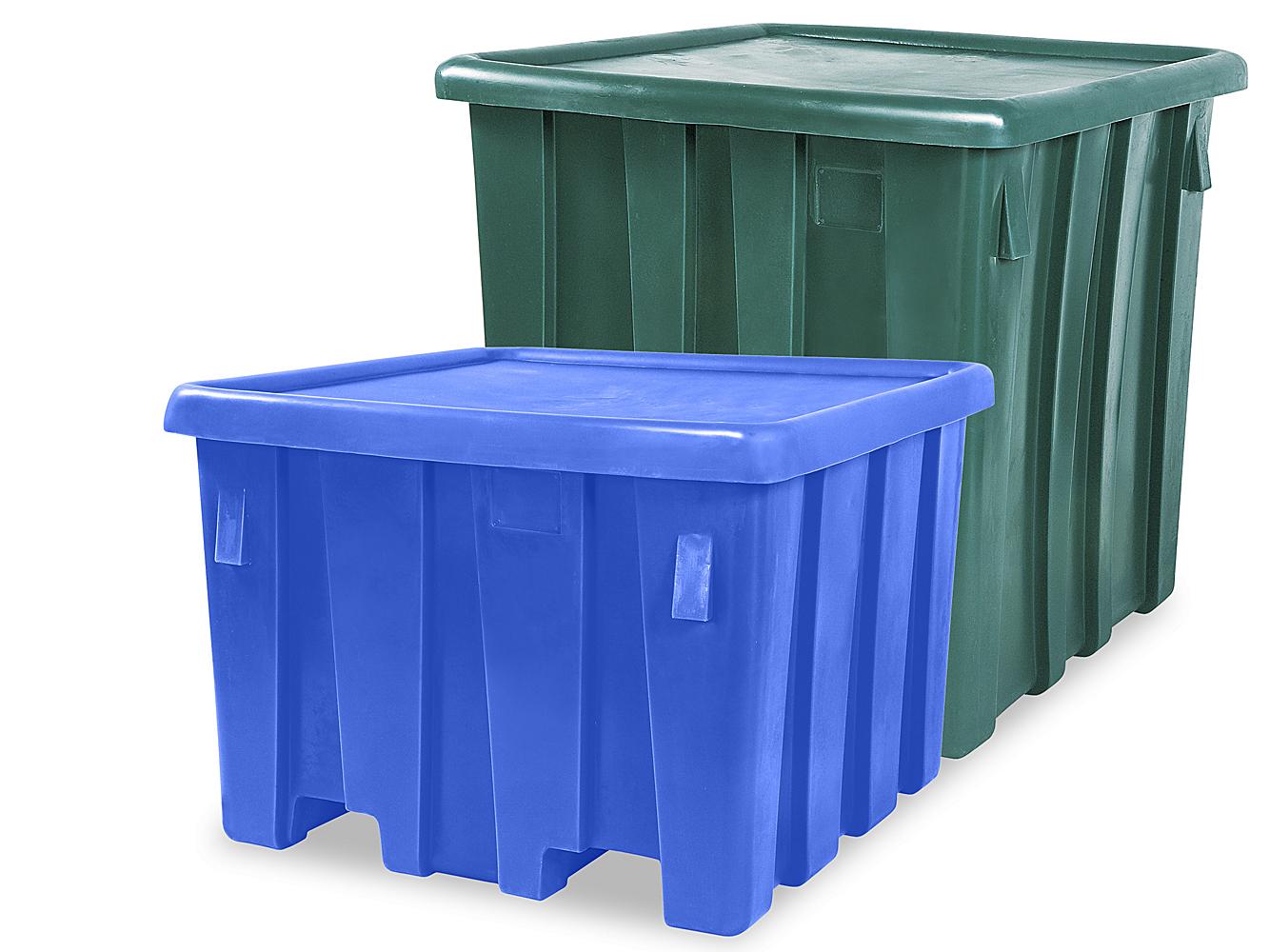The Duty of Mass Plastic Containers in Effective Recycling Practices and Sustainability
Bulk plastic containers are indispensable to modern recycling efforts. Their style boosts the performance of product collection and transport, adding to sustainability goals. These containers not only maximize space but also aid in checking contamination degrees. Their execution is not without obstacles. Recognizing the full range of their impact discloses an intricate connection in between logistics and environmental responsibility that calls for further exploration.
Understanding Mass Plastic Containers
Bulk plastic containers work as a vital part in numerous sectors, facilitating the storage and transport of items. These containers are usually made from durable materials such as high-density polyethylene (HDPE) or polypropylene, which provide longevity and resistance to environmental factors. Their design commonly consists of features like stackability and modularity, enabling reliable use of area during both storage space and transportation.
Industries such as farming, food processing, and manufacturing frequently utilize bulk plastic containers due to their light-weight nature and ease of handling. The containers can be found in numerous dimensions and setups, accommodating the particular needs of various items. Their adaptability extends beyond simple capability; they can also be personalized with lids, deals with, and identifying alternatives to boost usability - Bulk Plastic Containers. Consequently, mass plastic containers play a vital duty in enhancing logistics and supply chain operations across multiple sectors, thereby adding to overall performance and cost-effectiveness
Advantages of Using Bulk Plastic Containers in Recycling
When organizations prioritize reusing efforts, the usage of bulk plastic containers significantly improves the effectiveness of the procedure. These containers are made to enhance area, permitting the storage space and transport of bigger quantities of recyclable materials. This leads to less trips to recycling facilities, thereby reducing gas intake and linked exhausts.
Additionally, bulk plastic containers are durable and immune to different ecological aspects, making sure that products remain shielded during handling and transit. Their light-weight design even more adds to decrease transport prices.
The harmony of these containers helps with better sorting and handling of recyclable products, which can enhance general recycling rates. Organizations that embrace bulk plastic containers likewise demonstrate a commitment to sustainability, positively affecting their brand photo. Inevitably, these advantages not just simplify recycling methods however likewise add to wider ecological objectives
Exactly How Mass Plastic Containers Facilitate Product Collection
Effective material collection is substantially improved by the use mass plastic containers, as they give a structured and effective service for gathering recyclable things. These containers are developed to suit big volumes of materials, which streamlines the sorting and storage space procedure. Their stackable design optimizes area usage, making it less complicated for facilities to organize recyclables without mess.
Furthermore, mass plastic containers are weather-resistant and durable, enabling for exterior positioning without degradation. This durability guarantees that materials remain safeguarded till they are gathered for handling.

The harmony in shapes and size of these containers facilitates standardization across collection factors, making it possible for much better monitoring of recyclable quantities. Their clear nature allows for very easy visibility of components, aiding in the tracking of contamination levels and guaranteeing that just appropriate products are accumulated. On the whole, mass plastic containers play a critical function in streamlining the material collection process, thus advertising effective reusing methods.
Transport Performance and Environmental Influence
Transport effectiveness plays a crucial duty in the recycling process, specifically through the optimization of tons capacity in bulk plastic containers. By taking full advantage of the quantity of product transported, firms can greatly decrease the number of journeys needed, therefore minimizing their carbon footprint. This technique not just boosts functional effectiveness but additionally adds to a lot more lasting ecological methods.

Enhancing Lots Capability
Although optimizing load ability is usually forgotten, it plays a necessary duty in enhancing transport efficiency and reducing environmental influence in recycling techniques. By optimizing the quantity that bulk plastic containers can hold, recycling procedures can minimize the variety of trips required for transport. This not just decreases gas intake however likewise lowers the deterioration on vehicles. Efficient tons monitoring permits centers to make use of area successfully, making sure that each transport cycle is as efficient as feasible. Furthermore, well-optimized tons can lead to much better negotiations with logistics providers, possibly minimizing overall expenses. Eventually, enhancing load ability adds to a much more sustainable recycling system by cultivating efficient source use and minimizing waste created during transportation.
Reducing Carbon Footprint
As reusing operations venture to reduce their ecological influence, lowering the carbon impact connected with transportation becomes a critical objective. Bulk plastic containers play a vital duty in attaining this purpose by enhancing lots efficiency and enhancing logistics. Their lightweight yet resilient layout enables optimum cargo area usage, decreasing the variety of trips called for to carry materials. By consolidating shipments, recycling centers can reduce fuel consumption and greenhouse gas emissions. On top of that, purposefully finding recycling facilities minimizes transportation ranges, furthermore decreasing carbon outcomes. Furthermore, utilizing fuel-efficient automobiles and different power sources enhances overall sustainability. By integrating these techniques, the reusing sector can substantially diminish its carbon impact, contributing to an extra sustainable future.
Obstacles in the Use of Mass Plastic Containers

Contamination Problems
Contamination problems represent a considerable obstacle in the efficient use mass plastic containers within recycling techniques. These containers typically accumulate residues from previous components, bring about combined materials that can prevent the reusing process. Impurities such as food waste, chemicals, or non-recyclable products can endanger the stability of the whole set, resulting in enhanced disposal costs and decreased reusing prices. Furthermore, inappropriate cleansing or sorting can exacerbate these concerns, making it challenging for recycling facilities to refine products effectively. The visibility of impurities not just influences the high quality of recycled items but likewise weakens the overall sustainability initiatives intended at reducing plastic waste. Resolving these contamination challenges is essential for boosting the effectiveness of mass plastic container recycling.
Recycling Infrastructure Limitations
Inefficiency in reusing infrastructure positions substantial obstacles for the reliable monitoring of mass plastic containers. Lots of recycling facilities lack the ability to refine large quantities of these containers efficiently, causing raised prices and delays. Additionally, poor arranging technologies usually bring about contamination, as bulk containers might be blended with various other products, making complex the reusing process. Restricted transportation options additionally prevent the activity of bulk plastic containers to appropriate reusing centers, causing increased land fill waste. In addition, a lack of standard methods for mass container recycling produces complication amongst customers and organizations, better making complex initiatives to promote sustainability. Attending to these infrastructure constraints is necessary to enhance reusing methods and make the most of the capacity of mass plastic containers in a circular economy.
Best Practices for Implementing Bulk Plastic Containers
When companies take into consideration applying mass plastic containers in their recycling methods, they must focus on a tactical technique that boosts performance and decreases contamination risks. First, picking the proper container dimension and type is vital to accommodate the volume of products being refined. Organizations should likewise develop clear labeling and signs to assist users on appropriate disposal methods, decreasing confusion and errors. Routine training sessions for staff can even more strengthen these methods, ensuring everybody understands their duties in preserving recycling integrity.
Furthermore, companies must execute a regular maintenance schedule to inspect and tidy containers, preventing the build-up of pollutants. Partnering with regional reusing centers can additionally streamline the collection process, making certain that products are efficiently processed. Lastly, companies must keep an eye on and assess their recycling metrics, utilizing this data to fine-tune methods gradually and promote continuous renovation in their sustainability initiatives.
The Future of Mass Plastic Containers in Sustainable Practices
As organizations increasingly prioritize sustainability, the role of mass plastic containers in recycling methods is set to evolve significantly. Technologies in materials scientific research are resulting in the growth of recyclable and naturally degradable options, improving the ecological benefits of mass plastic containers. Additionally, the execution of closed-loop systems will permit simpler collection and repurposing of these containers, reducing waste and source intake.
Technological advancements, such as smart monitoring systems, will make it possible find here for companies to check the lifecycle of bulk containers, enhancing performance in recycling procedures. As consumer demand for sustainable techniques grows, companies will likely adopt bulk plastic containers developed for reuse and long-term worth. Moreover, collaboration between federal governments and industries will certainly foster the facility of standard recycling procedures, making certain that mass containers are successfully integrated right into broader sustainability efforts. On the whole, the helpful resources future of mass plastic containers shows up promising, with considerable potential for adding to a circular economy.
Frequently Asked Concerns
Just How Are Mass Plastic Containers Made and What Products Are Utilized?
Bulk plastic containers are normally made from high-density polyethylene (HDPE) or polypropylene (PP) These materials are processed via shot molding or impact molding methods, resulting in long lasting, lightweight containers suitable for numerous storage and transport needs.
Can Mass Plastic Containers Be Reused Numerous Times Before Recycling?
Yes, bulk plastic containers can be reused several times prior to recycling. Their sturdiness and layout enable repeated usage in various applications, promoting sustainability and source performance while minimizing the requirement for new containers.

What Qualifications Exist for Bulk Plastic Containers in Recycling?
Different accreditations for mass plastic containers include the Recycling Collaboration's accreditation, the Cradle to Cradle Certified ™ requirement, and the Sustainable Product packaging Union's guidelines, ensuring containers fulfill details ecological and recyclability requirements for efficient recycling.
Just How Do Mass Plastic Containers Compare to Various Other Recycling Storage Space Options?
Mass plastic containers provide better durability and capability compared to other recycling storage space choices, decreasing the threat of contamination and helping with reliable transport. Their layout supports much better organization, boosting total efficiency in recycling operations.
What Is the Life-span of a Bulk Plastic Container in Recycling Processes?
The life-span of a bulk plastic container in recycling procedures commonly ranges from 5 to one decade, relying on usage, material high quality, and environmental problems, enabling for several cycles of usage before eventual disposal or recycling.
When companies prioritize recycling efforts, the utilization of mass plastic containers substantially enhances the performance of the process. Transport efficiency plays a vital role in the reusing process, specifically through the optimization of tons capacity in bulk plastic containers. The use of mass plastic containers in recycling techniques encounters substantial difficulties, specifically concerning contamination problems and constraints within recycling framework. Contamination concerns represent a significant obstacle in the efficient use of mass plastic containers within recycling methods. When organizations think about applying bulk plastic containers in their reusing methods, they ought to focus on a critical strategy that improves performance and reduces contamination dangers.